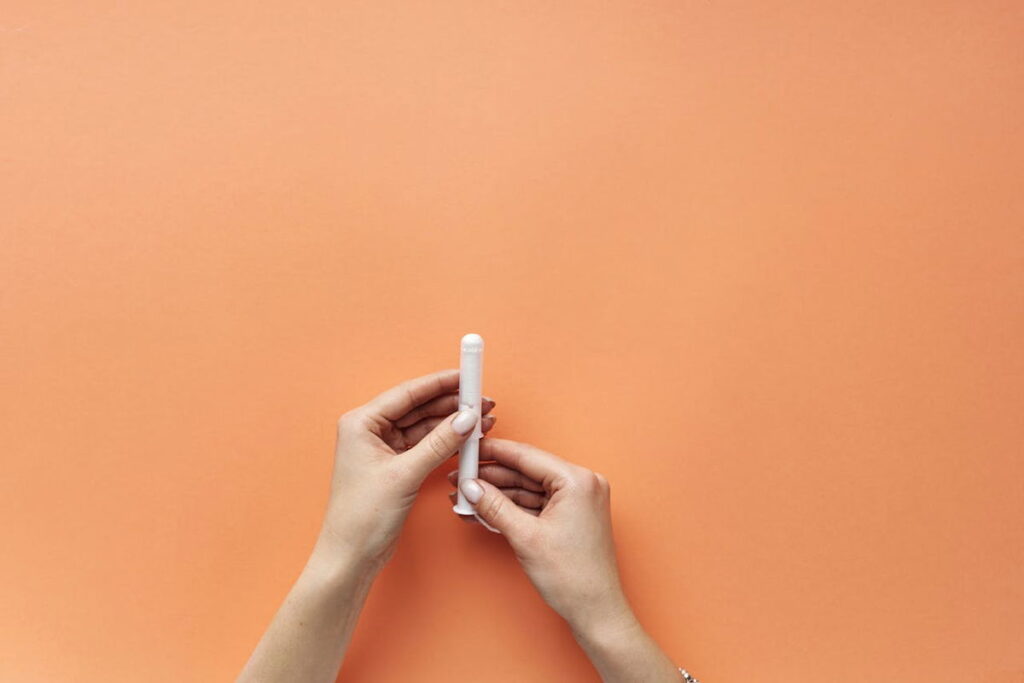
Tampon with applicator. Credit: Cliff Booth, Pexels
Glyphosate, a controversial weedkiller linked to cancer, has been discovered in tampons sold in the UK at 40 TIMES the legal drinking water limit, according to a new May 2025 report.
The findings have reignited concerns over chemical safety in period products and the lack of regulation in both the UK and Europe.
Glyphosate in period products sparks alarm
A new report by Wen and PAN UK has revealed worrying levels of glyphosate – a pesticide classified by the World Health Organization (WHO) as a “probable carcinogen” – in one of 15 boxes of UK tampons tested. The residue level (0.004 mg/kg) was 40 times the UK and EU legal limit for drinking water (0.0001 mg/kg).
Though this sample was small, campaigners say the discovery points to a wider problem. “If this level of glyphosate is deemed unsafe in the water we drink, why is it allowed to appear in our period products?” said Amy Heley, Public Affairs Manager at the Pesticide Collaboration. (Cited by The Guardian.)
Glyphosate is widely used in global cotton production, including crops used for tampons and pads. Chemicals absorbed via the vagina enter the bloodstream directly, bypassing the body’s detox processes. This raises serious concerns about how “safe” these products really are.
Glyphosate use in Europe: Legal but controversial
Despite public pressure, glyphosate is not banned in the EU. In November 2023, the European Commission extended its approval for another 10 years, until December 15, 2033. The decision followed an EU-wide risk assessment which concluded there was “no scientific or legal justification for a ban” – but acknowledged ongoing public health concerns.
Here’s what’s important to know:
- Glyphosate may still be used in EU agriculture, subject to national approval and restrictions.
- Member states like France, Germany and Luxembourg have imposed partial bans or stricter usage rules.
- The chemical is still detected in European food, water and even air, due to its widespread use.
Crucially, there is no EU residue limit for menstrual products, so levels like those found in UK tampons are not technically illegal – despite being higher than what’s allowed in food or water. Campaigners argue this regulatory gap must be closed.
Toxic ingredients: No ingredients list means no consumer choice when buying period products
In the UK, there is no legal requirement for manufacturers to list what’s in their tampons. That means potentially toxic substances like the ones below can all go unreported:
- PFAS “forever chemicals”
PFAS are man-made chemicals. There are over 4,700 types. They are used to make products water- and stain-resistant. According to the US EPA and European Chemicals Agency, exposure to PFAS has been linked to a higher risk of kidney cancer. It can also disrupt thyroid function, lower fertility, and reduce birth weight. PFAS may weaken the immune system, raise cholesterol levels, and damage the liver.
- Phthalates
Phthalates are chemicals used to make plastics flexible and to carry fragrance. They are known hormone disruptors. According to the WHO and the NIH, phthalates can lower sperm count and quality, interfere with puberty and menstruation, and raise the risk of endometriosis. They may also be linked to asthma and childhood obesity.
- Heavy metals like lead and arsenic
Lead and arsenic are toxic heavy metals. Even small amounts can be harmful. Lead can affect brain development, cause high blood pressure, kidney problems, and reduce fertility. Arsenic is a known cancer-causing chemical. It can also weaken the immune system and disrupt how cells work.
- VOCs (volatile organic compounds)
VOCs, or volatile organic compounds, are gases that easily escape from some products, especially those with fragrance or glue. Long-term exposure can irritate the lungs, cause headaches and fatigue, and harm the liver and kidneys. Some VOCs, like benzene, are known to cause cancer.
- Glyphosate and its by-product AMPA
Glyphosate is a widely used herbicide. Its main by-product is AMPA. The WHO says glyphosate is “probably carcinogenic to humans.” It has been linked to non-Hodgkin lymphoma and may disrupt hormones and affect reproduction. AMPA is considered less toxic but is still persistent in the environment.
The report urges the UK government to regulate menstrual products in the same way as cosmetics: with full ingredient disclosure, independent residue testing, and strict safety standards.
Wen and PAN UK are calling on the government to:
- Introduce robust testing of period products
- Enforce full labelling of ingredients and additives
- Ensure school schemes offer only certified organic, additive-free products
- Pass a Menstrual Health, Dignity and Sustainability Act to improve access, safety and transparency
With glyphosate remaining legal across Europe, and tampons still largely unregulated, the report serves as a wake-up call for governments to take menstrual product safety seriously.
Not only do women have to worry about the long-known risk of toxic shock syndrome (TSS) when using tampons, but now they also face growing concerns over exposure to potentially harmful chemicals hidden in the very products meant to support their menstrual flow.
Read the full report here: Blood, Sweat and Pesticides – May 2025
View all health and beauty articles.






